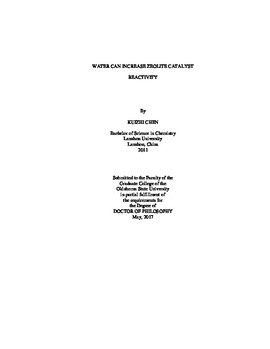| dc.description.abstract | Historically, water is considered to reduce activity in zeolite-based hydrocarbon catalysis. Currently, there exists widespread interest in understanding synergistic impacts of water in catalytic transformation of non-traditional hydrocarbon feedstocks by zeolites, e.g. biomass feedstocks, since significant amounts of water are liberated in initial reaction stages. Questions regarding water's active or passive role in solid acid catalysis have prompted our work on studying fundamentals of water-zeolite interactions by in-situ magnetic resonance methods. We have developed multiple methods of introducing water into zeolite from trace amounts to access amounts. The small loading results, below 0.5 water molecules per acid site, have shown interesting onsite interaction information at molecular level, for example, suggesting the acid site proton can be deprotonated by a single water molecule. In addition, the introduction of water to hydrophobic organosilane modified zeolites shows liquid water can be blocked outside the crystallites, implying potential application of the hydrophobically modified zeolite. For water's positive impact on hydrocarbon reactions, we have experimentally shown that trace amounts of water enhance isobutane reactivity in HZSM-5 by up to an order of magnitude (ACS Catalysis 2014, 4, 3039). Subsequently, active sites were characterized in the presence of water for hydrophilic and hydrophobically-modified zeolites (ACS Catalysis 2015, 5, 7480). From that work, we determined that only vapor-phase water could access acid sites in organosilane modified catalysts, while liquid-phase water was excluded from the catalyst interior volume, leading to increased catalyst lifetimes in water-rich environments (JACS 2015, 137, 11810). Moving forward, we recognize that aromatic reaction centers are common to many important hydrocarbon conversions in zeolites. Specifically, alkylation-dealkylation steps have been shown as key steps in methonal-to-hydrocarbon (MTH) conversions. Aromatic alkylation-dealkylation reactions are investigated as test reactions to probe whether water can play an active role in lowering activation energies for the critical side-chain alkylation and dealkylation steps. | |
